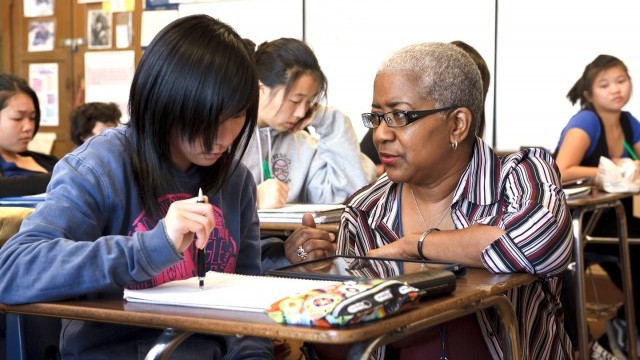
Lenny Gonzalez
Part 3 in the series Learning In the New Economy of Information.
During a recent unit on World War II, Courtney Wilhelm’s U.S. History class conducted a leader’s conference. Students explored broad topics such as economic and political philosophies from the perspective of European leaders from the 1930’s and 1940’s. When that activity was finished, the students were asked to respond to current global issues from the perspective of their leader, and the topic of the Russian annexation of the Crimea came up. Wilhelm was able to draw parallels between Crimea and Hitler’s annexation of the Sudetenland from Czechoslovakia. Each of the students was able to connect their expertise on a past leader to gain insight on today’s world, and Wilhelm was able to use her expertise on both history and current events to take the lesson to a new level.
In classes where students connect ideas from the abstract to real-life events, the role of the teacher -- as Wilhelm illustrates -- moves from being a distributor of information to one of nurturing students as they collect, evaluate, and process information into unique learning products. The students’ role consequently moves from that of a receiver of the teacher’s knowledge to that of a researcher, curator, and creator. Products of student creation and individual expressions of learning become important parts of the learning process that are shared, evaluated by classmates, and built upon by the teacher.
For some, these changing roles might signal the end of an era where the teacher serves as a content expert. It may seem as though the teacher no longer carries the sole responsibility for content delivery, bringing into question the need for them to master their entire field in order to teach. Why must teachers spend their entire career mastering the information in their chosen field if this responsibility will ultimately fall to the students in class?
In reality, however, the converse is true. As students delve into content within any unit, especially where they're given choices in selecting their topic, natural gaps will occur in their understanding. There will still be a need for context and background knowledge as they work to research and process their sources. It's unlikely that, even when given guidelines to narrow the possibilities, students working independently will all end up focusing in the same place. When students work in groups, or as individuals, their products will be varied, and often -- at first glance -- seem disconnected, dissimilar, and separate.
